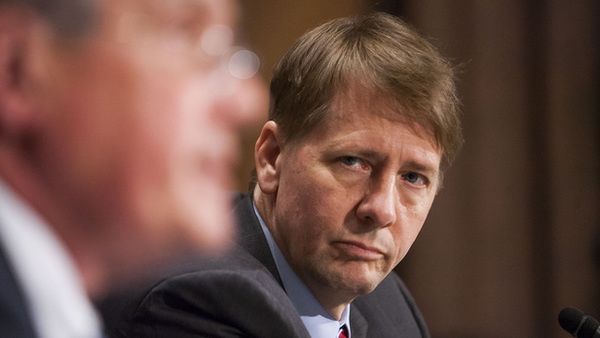
The CFPB on Monday released final rules that will restrict the use of arbitration clauses in financial contracts—specifically rejecting the argument made by credit unions that they should be exempt from the regulations.
“While credit unions may be nonprofit, member-owned entities that may have fewer incentives to engage in problematic practices with their members, it is not true that credit unions have never violated the law and have never faced cases in response to their past violations of the law,” the CFPB said in its explanation of the rule.
Arbitration agreements make it virtually impossible for consumers to join together to file suit and seek damages from financial institutions, CFPB Director Richard Cordray said, in a conference call with journalists.
“Including these clauses in contracts allows companies to sidestep the judicial system, avoid big refunds, and continue to pursue profitable practices that may violate the law and harm large numbers of consumers,” he said.
“Few consumers are aware of these clauses and even fewer know how they work,” Cordray said.
Under the rule, companies still will be able to include arbitration clauses in their contracts, but they may not use those clauses to stop consumers from being part of a class action lawsuit. The rule specifies the language that must be used in the contract.
The rule also requires companies to submit to the CFPB detailed information about claims and awards made in arbitration. That data eventually will be made public, with consumer names and identifying data removed.
The rule applies to any new financial contracts entered into 241 days after the regulations are published in the Federal Register.
The rule is likely to create a firestorm on Capitol Hill, where House Republicans have included in pending legislation language that would specifically prohibit the CFPB from issuing the regulations.
The House has passed Financial Services Chairman Jeb Hensarling’s (R-Texas) Financial CHOICE Act, which will curtail many of the CFPB’s powers and specifically prohibit it from issuing the arbitration rules.
House Republicans have included similar provisions in their version of the FY2018 Financial Services Appropriations bill.
Cordray acknowledged that opposition.
“I am, of course, aware of those parties who have indicated they will seek to have the Congress nullify this new rule,” he told reporters. “That is a process that I expect will be considered and determined on the merits. My obligation as the director of the consumer bureau is to act for the protection of consumers and in the public interest. In deciding to issue this rule, that is what I believe I have done.”
Credit union officials have argued that they should be exempt from the rules since they are member-owned. They said members would essentially be suing themselves if they file suit.
The CFPB rejected that argument.
“The CFPB already has rejected the idea that credit unions should be exempt from the agency’s regulations,” the agency said in an explanation of the rule.
Credit union groups also asserted that many credit unions do not use arbitration clauses in their contracts. The CFPB said that means the rule will have little impact on credit unions.
“With respect to credit unions, the Bureau does not believe that member ownership is a sufficient compliance incentive to replace a right to enforce the relevant laws on a class basis,” the bureau said in explaining the rules.
Credit union members may be unaware about membership accountability mechanisms and are unlikely to mount a campaign among members to hold the financial institution accountable.
And the CFPB rejected a call for credit unions to be exempt from the reporting requirements.


